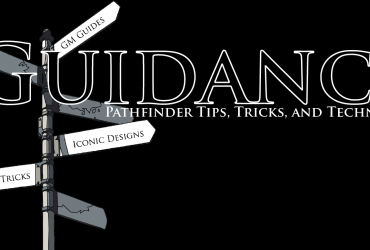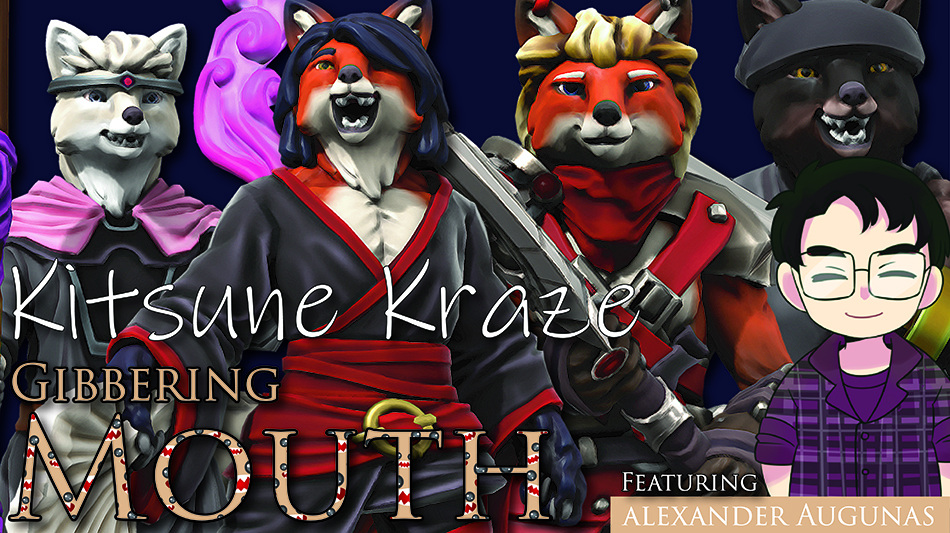Welcome to Guidance, Private Sanctuary’s source for tips and techniques for the Pathfinder Roleplaying Game, written by Everyman Gamer Alexander Augunas. Today, we’re going to be talking about the Leadership feat.
It seems like last week that I finished my first article that covered a controversial topic. (It was; I finished examining the rogue class last week.) Well, apparently I’m a glutten for punishment because this week on Gibbering Mouth I’m back with an opinion on another controversial topic. That said, whereas people’s opinions are noticeably split in regards to the rogue class, there is a noticeable majority side in the issue I am going to talk about today and I’m almost positive that I’m in the minority. Today’s topic is arguably one of the most powerful PC options in the game, the Leadership feat.
Leadership Crash Course
I’m going to keep this brief because I’m assuming that you fine folks all know what the Leadership feat is. If you don’t, crack open your copy of the Pathfinder Roleplaying Game Core Rulebook and look it up in Chapter 5; you can’t miss it. As its name suggests, the Leadership feat allows characters to become leaders in their own right, attracting both powerful heroes and loyal subordinates to their cause. Despite being one of the most prolific and debated feats in the game, the text is extremely straight forward; there isn’t much that I can say about it that the feat doesn’t say itself.
The Problem With Leadership
I want to refocus your minds back to our discussion on the Action Economy from a few weeks ago. Remember how we mentioned that generating additional actions during a turn is difficult? Well, the major reason that the Leadership feat is so powerful, and therefore is so contested, is that it is able to grant a player (note, not a PC but its player) additional actions during combat by granting the PC a high-level cohort. This isn’t counting the myriad of other benefits having an entire character at your beck and call can produce, such as having a secondary character to place all of your party’s crafting feats onto or covering a party weakness. The Leadership feat is not difficult to qualify for (it only requires a character level of 7th) and can even grant access to special mounts. There is no other feat in the game that has this level of power, which is why the Leadership feat is almost universally rated as a must-have if (and only if) your GM allows its selection. Unlike other options, which often have debate behind them, there is no debate on the power of the Leadership feat.
Which is, of course, why my house rule is that all players gain Leadership for free at 7th level.
Fixing Leadershi… SAY WHAT?!?!!?
I wonder how many of my readers did a double take when I calmly stated that I give all of my players the most powerful feat in the game for free. Note that this is where my opinion of the Leadership feat tends to differ from that of most GMs; personally, I think that that when you’re dealing with individuals who are rapidly gaining power and fame, followers and cohorts are assumed, not sought after. People flock around mighty heroes and dastardly villains in the real world, so why wouldn’t they do the same in a fantasy world and more importantly, why should I deny my players an all-important feat to give them something that should be happening organically as part of the game’s storyline anyway? That said, I do have some important house rules and limitations on the Leadership feat that I enforce upon my PCs. Here are a few of them:
- Followers are never assumed. If you want to attract followers, that’s awesome, but you have to actually go out and recruit them. Make some passionate speeches or become an important governmental figure or something. I don’t require my players to write stat blocks for every little follower they possess, but if you want followers you need to act like a leader.
- Cohorts are rooted in the story. While I usually allow my players to construct their own cohorts, I do require them to possess a backstory connection to the campaign if the cohort isn’t an existing character already. That said, my players are also welcomed to recruit low-level NPCs that they’ve encountered and enjoyed and train them/help them rise to the challenge of being a cohort.
- Replacing cohorts is a pain. I don’t like the idea that there are tons of high-level characters waiting around that are just itching to be your cohort. I like my players to be attached to all of my campaign’s NPCs, so I encourage raising dead cohorts from the grave from both a mechanical and story-based standpoint when possible. If the PC wishes to replace his or her cohort, they have to go out and search for one; only one free cohort creation per PC at my table!
- One Cohort per Adventure. This rule isn’t really a problem at my table because I explain the rule as soon as my PCs reach 7th level, when I dropped my Leadership bomb on them. My PCs are only ever allowed to bring one cohort with them on their adventures with them. The other four cohorts are to wait outside and secure a camp, scout, or act as sort of a “call for backup” if something goes wrong. If a cohort dies, they can backtrack and call the other cohorts in to retrieve the body and/or replace him. The reason I hold this policy is for encounter planning; it is easy to adjust my XP track to account for four PCs and one cohort, but four PCs and four cohorts is too much to keep track of. Additionally, not all of my players are advanced enough to want to keep track of multiple characters during a combat. Even at an advanced table I don’t think that I would allow all of my PCs to bring all of their cohorts because it would make a balanced combat take FOREVER.
If You Lead, I Will Follow
Here’s another place where I’m sure to butt heads with others; I don’t even think that the cohort is the most fun aspect of Leadership. For me, it’s the followers that make Leadership fun. Although they’re not going to be good for combat by any stretch of the imagination, followers can be extremely useful to a GM who allows them to be useful. Followers can perform menial tasks for you, assist you in your skill checks, provide you with useful information, and help to improve your reputation. If followers are handled well, they become low-level characters affiliated with you that can help to improve the story if handled well. Although it is not feasible for every follower in your ever-expanding list to have a fully fleshed out character, the way I see it is that those “nameless” followers are the people that your named followers can go to for help and assistance. A man named Tom Peters once said that “Leaders don’t create followers, they create more leaders,” and he’s absolutely right. By only going into detail in regards to a handful of followers, you create a better feel of organization; the people your PC knows are at the top of the “totem pole” while people he doesn’t are closer to the bottom.
Other Things for Followers and Cohorts to Do
Followers and cohorts can do a heck of a lot more than mindlessly march to their deaths with you. Here are a few examples:
- Trained into Teams: Ultimate Campaign introduced the downtime system, which includes the ability to create taskforces called teams. Far from GM hand waving, having followers in your organization is hugely beneficial to you: every five followers in your organization grants you a +1 bonus on leadership checks to avoid losing the business. Furthermore, you enlist one of your followers (or your cohort) to act as your manager: I don’t know about you, but if I’m going to be paying someone to work for me I would prefer someone who was loyal to me!
- Doing the Heavy Work: In addition to preventing “leadership attrition” as described above, followers also make your capital expenditure more efficient. If you’re playing with the Downtime Rules, you can effectively generate bonus Influence or Labor by possessing followers: you get +1 capital per two followers in the settlement where the downtime takes place, to a maximum of 50% of the total capital spent. This makes building your business much cheaper in the long run, and in my personal opinion this is a better benefit of Leadership than the cohort itself!
- Run a Side Business: Less for your followers, more for your cohort. You could easily have your cohort building his or her own side projects alongside your PC. For example, in a game that I play in my cohort is building up a ninja garrison while my PC is spending his money building elaborate arenas, orphanages, and funding the arts.
- Assume Leadership Roles: Ultimate Campaign is really good to followers and cohorts. If you’re using the Kingdom Building rules, named followers and your cohorts can serve leadership positions for your kingdom, rounding out your slots. In this regard, Leadership allows you to generate loyal characters to help your kingdom thrive. That way even if your cohort can’t come adventuring with you, you can rest easy knowing that he/she is busy keeping your kingdom afloat in your absence.
- Create an Army of Followers: Although this isn’t very feasible with the current follower scaling, you could certainly create a small militia force out of your followers if you so desired. Ultimate Campaign’s combat rules will probably leave the lot of them dead and dying on the battlefield, but hey! At least they died serving someone they loved.
- Contacts: More love for Ultimate Campaign, the book also introduced a new “contacts” system. Rather than acting as people who are always blindly loyal to your cause, your followers could act as contacts as noted by that product.
- Laborers: If you’re the crafting type, having a small army of followers grant you aid another bonuses on your crafting checks is VERY helpful. As a matter of fact, using many people to help you craft your armor is one of the only ways to effectively craft adamantine armor in a respectable amount of time.
- Bullet Points: For more ideas on things you can do with Leadership, check out Rogue Genius Game’s Leadership Bullet Points product: it’s a great little product that gives some ideas for the Leadership feat that don’t include followers or cohorts. I wouldn’t consider using those variants in my games because I love followers and cohorts, but for GMs who are still squeamish in regards to Leadership, it’s a good substitute.
And that about wraps up my thoughts on the Leadership feat … for now. What do you think? What are your experiences with the Leadership feat as a player or GM? Do you like the idea of giving your PC additional characters or do you think that its too much? Would any of my suggestions fly at your table? Why or why not? Leave your answers and comments below and I’ll see you next week when I rant and rave about some other topic here at Gibbering Mouth! Don’t miss it!
Alexander “Alex” Augunas has been playing roleplaying games since 2007, which isn’t nearly as long as 90% of his colleagues. Alexander is an active freelancer for the Pathfinder Roleplaying Game and is best known as the author of the Pact Magic Unbound series by Radiance House. Alex is the owner of Everyman Gaming, LLC and is often stylized as the Everyman Gamer in honor of Guidance’s original home. Alex’s favorite color is blue, his favorite Pathfinder Race/Class combination is kitsune aristocrat, and his favorite pastime is building orphanages with the Downtime Rules. Think of the children!







Leave a Reply